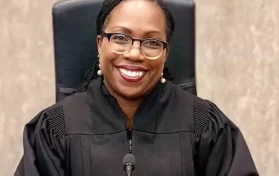
The second day of questioning in the confirmation hearings for Ketanji Brown Jackson has been rather eventful. Nominee Jackson offered many quotable moments in Tuesday’s proceedings, with anecdotes regarding her defending a Gitmo detainee as well as opinions on radical Islam and Roe v. Wade.
Jackson’s one-time defense of a Guantanamo Bay detainee has been the source of some criticism, particularly by conservatives who question whether the Supreme Court nominee might be considered “soft on crime.” However, Brown Jackson related defense of these individuals to a “public service.” She even equated it to the military service her brother carried out in the Middle East. Ketanji Brown Jackson said that she is of the belief that everyone is entitled to representation, regardless of their attorney’s personal beliefs. She also added, “That’s what makes our system the best in the world. That’s what makes us exemplary.”
Senator Lindsey Graham (R-SC) questioned Brown Jackson regarding her thoughts on radical Islam. He asked her point blank, “Do you personally believe that al-Qaeda, ISIS-type groups are still at war with us?” Jackson replied, “I think yes. I mean –” before Graham asked her to confirm that “certain elements of radical Islam” considered themselves to be at war with the United States. Jackson would affirm Graham’s statement.
Jackson would also defend herself against claims made by Senator Josh Hawley (R-MO), who had said that her rulings and sentences in regards to individuals convicted on child pornography charges are too lenient. Hawley had explicitly told Jackson that he would be questioning her about certain cases in particular; however, on Tuesday morning, Senator Dick Durbin (D-IL) seemed to provide Jackson with some assistance by giving her an opportunity to speak on the matter before Hawley was able to question her. She would eventually say that Hawley’s implication that she is “soft on child pornography offenders” is “nothing further from the truth.”
Jackson appeared shaken as she looked in Hawley’s direction on the panel while answering Senator Durbin’s question.
Perhaps one of the most intriguing questions of the day, however, came from Republican John Cornyn (TX). Cornyn was questioning Jackson regarding the 14th Amendment, in particular the “substantive due process” clause in the law. Cornyn cited the Dred Scott decision, which used the 14th Amendment to declare that “people of African descent were not U.S. citizens.”
Jackson’s answer was a winding road of examples of how the 14th Amendment and due process offered the “protection of certain personal rights related to intimacy and autonomy.” She also related that the 14th Amendment protected the right to marriage, abortion, contraception, but Cornyn interjected: “(the right to) Treating slaves as chattel property?” To which Jackson replied that she “didn’t quite remember the basis for the Dred Scott opinion.”
Cornyn then reiterated his point: “The fact is . . you can use substantive due process to justify basically any result?” Jackson then referred to the Court’s standard in place for identifying the rights preserved by substantive due process.
While the conservatives on the Judiciary Committee have vowed to keep the confirmation hearings civil, some Democrats are accusing Republicans of racist undertones. In particular, Senator Ted Cruz (TX) asked Jackson if certain children’s books associated with teaching Critical Race Theory are being taught in the Georgetown Day School, where Jackson serves as member of the the school’s board of trustees. Georgetown Day School is reputed to “promote the concept of Critical Race Theory.”
Jackson did say that the board of trustees had little to do with curriculum at the school, but, in her personal opinion: “I do not believe that any child should be made to feel as though they are racist or though they are not valued, that they are victims (or oppressors). I don’t believe in any of that.”
Jackson’s confirmation hearings will continue through Thursday of this week. Jackson has already been confirmed by this Senate body twice previously, and she is expected to be able to sail through the process this time as well.





